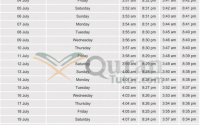How to Seek Forgiveness in Second Ashra of Ramadan
In the month of Ramadan where there are people who seek a better world hereafter by praying to Allah Almighty, there are others also who use this month to seek forgiveness for their sins. The objectives pertaining to Ramadan vary from person to person therefore, in Ramadan forgiveness is also one of the main objectives besides seeking blessings and mercy of Allah Almighty.
In Ramadan, it is the second Ashra that is associated with seeking forgiveness. Like the first Ashra that comes with mercy of Allah Almighty, the second Ashra is dedicated to giving a Muslim a chance to seek forgiveness from Allah the Forgiving. The lines below firstly discuss the importance of seeking forgiveness in Islam and then some tips on how you can seek forgiveness in second Ashra of Ramadan.

Forgiveness In Islam:
There are numerous ayahs of Quran and hadiths of Prophet Muhammad (PBUH) that emphasize and put stress on the concept of repenting over the sins and seeking forgiveness from Allah Almighty. In Quran, Allah Almighty says:
“And (commanding you): “Seek the forgiveness of your Lord, and turn to Him in repentance, that He may grant you good enjoyment, for a term appointed, and bestow His abounding Grace to every owner of grace (i.e. the one who helps and serves needy and deserving, physically and with his wealth, and even with good words). But if you turn away, then I fear for you the torment of a Great Day (i.e. the Day of Resurrection).” (Hud 11:3)
In this ayah, Allah Almighty commends people to seek forgiveness and repent. This seeking of forgiveness comes with dual benefits. Firstly, it shows that a person is conscious of Allah Almighty and His Lordship that he or she returns to Him as soon as he or she commits a sin. Secondly, from the ayah it is clear that Allah grants blessings and showers His grace on a person that seeks forgiveness from Allah. Therefore, a Muslim must forgiven excessively as a proof of his or her being a servant of Allah and for receiving blessings and grace.
At another place in Quran, Allah Almighty says:
“And verily, I am indeed Forgiving to him who repents, believers (in My Oneness, and associates none in worship with Me) and does righteous good deeds, and then remains constant in doing them, (till his death).” (20:82)
In this ayah of Quran, Allah tells of one of His qualities and that is His Forgiveness. A Muslim must never despair and lose hope about forgiveness as it is one of the qualities of Allah Almighty and He is always worthy of His qualities and whatever expectations a person has pertaining to Him.
Pertaining to forgiveness and repentance, Prophet Muhammad (PBUH) said in one of His hadiths:
“If anyone constantly seeks pardon (from Allah), Allah will appoint for him a way out of every distress and a relief from every anxiety, and will provide sustenance for him from where he expects not.” (Abu Dawud)
This hadith gives the benefit or virtues of seeking forgiveness. A person who is always seeking forgiveness from Allah Almighty, He makes life easier from him or her by removing all the troubles and distress they have in life and provides sustenance to them from sources from which they expect the least. Therefore, besides the cleansing from the past sins, forgiveness also helps in improving life and relation with Allah.
Forgiveness In Second Ashra:
The second Ashra of Ramadan is associated with seeking of forgiveness and a Muslim must make sure that he or she seeks forgiveness from Allah in these ten days of Ramadan. Pertaining to seeking of forgiveness a Muslim can opt for the following ways and methods.
Regular Prayer:
Ramadan or no Ramadan, prayers is perhaps the best means of seeking forgiveness from Allah Almighty. Ergo in the second Ashra of Ramadan, a Muslim must make sure that he or she is offering the obligatory prayers with regularity and after every prayer he or she supplicates to Allah for forgiveness and mercy. Thus, this is the reason why a Muslim must never miss the prayer especially in the second Ashra to ensure that no prayer goes without seeking forgiveness.
Ensure Taraweeh:
Taraweeh is a Ramadan specific prayer and is an additional chance available for a Muslim to praise Allah Almighty and then after the praise seek forgiveness and mercy from Him. Being specific to Ramadan and a Sunnah of Prophet Muhammad (PBUH) Taraweeh carries great reward and is greatly valued in the court of Allah as well, therefore, offering Taraweeh every night and then seeking forgiveness afterwards increases the chances of being forgiven. Therefore, every Muslim must ensure Taraweeh in the second Ashra in the same way as the first Ashra.
Tasbeeh:
In order to seek forgiveness from Allah Almighty it is imperative a Muslim lays foundation by praising and worshiping Him. Tasbeeh is a kind of praise and worship, which a Muslim can do throughout the day. The Tasbeeh can work in two ways. Firstly, the Tasbeeh of praise can be used to praise Allah and afterwards supplicate by seeking forgiveness. Secondly, the Tasbeeh of forgiveness is another option by undertaking which a Muslim can ensure that he or she is seeking forgiveness form Allah throughout the fasts during the second Ashra of Ramadan.
Supplicate:
To seek forgiveness a Muslim has to invoke Allah Almighty and the best way of doing so is by supplicating to Him. A Muslim must make sure that in Ramadan the one thing he or she does the most during the fast is supplicate to Allah Almighty and seek forgiveness excessively.
Read and Learn Quran
Another great way of seeking forgiveness from Allah is to read and recite the Quran along with its meanings. Learning the Holy Quran will help you in developing a strong connection with the holy book.
Bottom Line:
In a nutshell, seeking of forgiveness is synonymous with the second Ashra of Ramadan and a Muslim must indulge in acts of virtue and after every act seek forgiveness from Allah for all the previous sins so that He may forgive him or her and make this world and the world hereafter a better place for a Muslim.









